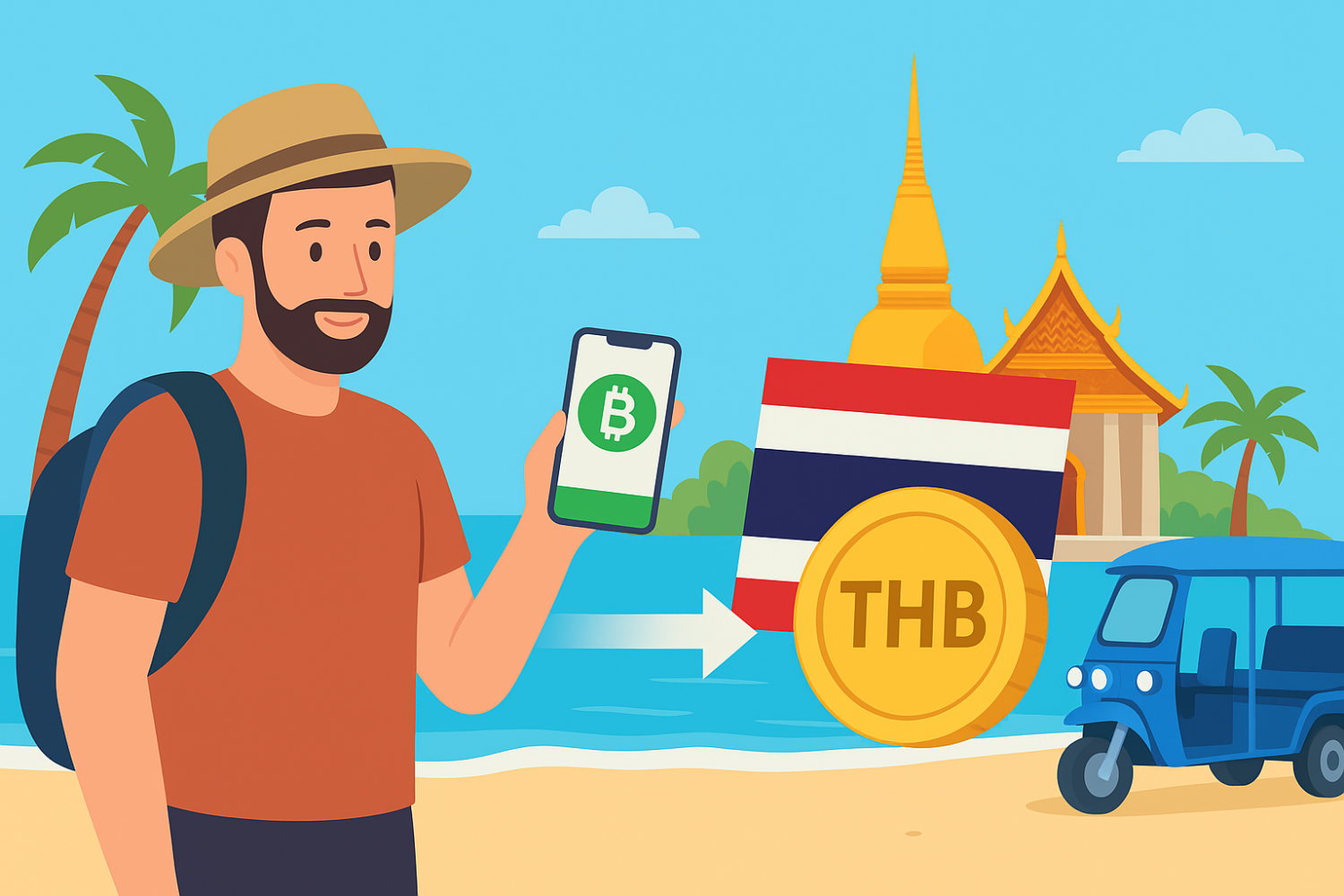How tourist spending is going digital

Starting in the fourth quarter this year, foreign investors arriving in Thailand can convert digital assets such as cryptocurrencies into baht to cover their travel expenses and spending in the country.
The initiative called TouristDigiPay is set for a nationwide pilot programme over 18 months within a regulatory sandbox. By allowing foreign tourists to use digital assets as a source of funds for their spending in Thailand, the government is promoting innovations to support the domestic economy and stimulate the stagnating tourism industry.
In addition, Thailand can capitalise on the growth of cryptocurrencies worldwide and position itself as a regional leader in the digital economy, note pundits.
Here is a closer look at the initiative to determine how it can help Thailand revive its key tourism sector.
HOW WILL TOURISTDIGIPAY WORK?
The TouristDigiPay sandbox allows digital asset operators regulated by the Securities and Exchange Commission (SEC) to collaborate with e-money service providers regulated by the Bank of Thailand to offer services to foreign tourists seeking to convert digital assets to baht for spending in Thailand via electronic payment (e-money) systems.
Under the sandbox, foreign tourists can make payments by scanning smartphone apps at various merchants across Thailand, including large retailers and small vendors.
Digital assets are not allowed to be used directly as a means of payment for goods and services, and merchants receive payments in baht.
Visitors need to open accounts with both a digital asset business and an e-money provider regulated by the SEC and central bank to ensure system safety.
Tourists must undergo standard identity checks, including KYC (know your customer) and CDD (customer due diligence), following the Anti-Money Laundering Office’s (Amlo) rules.
Once set up, tourists can swap their crypto for baht and pay electronically, including by scanning a QR code.
The Tourist Wallet is initially envisioned as an e-money tool for converting currency, with future plans to connect it directly to international debit and credit cards.
“The project includes appropriate risk management measures and follows KYC and CDD procedures in accordance with the standards set by Amlo and other relevant authorities,” said SEC secretary-general Pornanong Budsaratragoon.
These procedures apply to both digital asset business operators and e-money service providers. The SEC is revising relevant regulations and opened a pre-consultation phase for businesses to engage in discussions and make necessary preparations, starting from this month, she said.
The sandbox is expected to launch in the fourth quarter of 2025. Once the project concludes, its effectiveness will be evaluated to inform further development and expansion of the initiative, said Mrs Pornanong.

WHAT ARE THE RESTRICTIONS?
TouristDigiPay is not a direct crypto payment system where both customers and merchants transact in digital assets. The sandbox offers an alternative way for tourists to use digital assets while leveraging Thailand’s robust payment infrastructure.
To keep the transactions secure, spending caps are in place.
Tourists can spend up to 500,000 baht per month for payments to merchants that have passed the know your merchant process, and up to 50,000 baht for payments to small retail merchants.
Businesses flagged as high-risk for money laundering will not be allowed to accept payments, according to the SEC.
Fees for buying and selling digital assets in baht are to be specified by digital asset business operators participating in the sandbox.
Tourists cannot withdraw cash while the Tourist Wallet is active. Converted baht not used for transactions can be converted back into digital assets at an amount not exceeding the original digital asset amount converted into baht.
Tourists can only take money out when closing their Tourist Wallet account, which is meant to reduce the risk of misuse.
HOW DOES EMBRACING CRYPTO BENEFIT THE TOURISM SECTOR?
With TouristDigiPay, travellers can reduce reliance on cash and cards, yet shops and businesses in Thailand are still paid in baht.
The tourism sector contributes roughly 12% of the country’s GDP, but foreign arrivals from Jan 1 to Aug 17 are down 7% year-on-year to 20.8 million. China was the largest source market, with 2.93 million visitors.
The National Economic and Social Development Council cut its foreign tourist estimate for this year to 33 million from 37 million. The record for foreign arrivals was nearly 40 million in 2019.
“In Thailand, tourism has long served as a cornerstone of the economy. However, in recent years the industry faced mounting challenges, including global economic volatility, security concerns, and growing competition from neighbouring countries,” said Nirun Fuwattananukul, chief executive of Binance TH by Gulf Binance.
“Against this backdrop, integrating crypto-empowered payment options presents an unprecedented opportunity. It offers international travellers, particularly those who value digital-first experiences such as digital nomads and a rising number of crypto holders globally, a fast, convenient and cashless payment alternative, while also enhancing the appeal of Thailand’s tourism offerings.”
According to a recent report by Grand View Research, the global crypto payments market was valued at US$550 million in 2024 and is projected to reach $2.4 billion by 2033.
The report identifies increasing acceptance of digital assets as a driver behind this expansion, underscoring crypto payments are not only a symbol of financial innovation, but also a vital component of the future global financial system, said Mr Nirun.
Thailand is not alone in exploring this path. Earlier this year, Bhutan became the first country to launch a government-led national crypto tourism payment system, enabling foreign visitors to transact seamlessly using digital assets throughout their stay.
Crypto payments are also being adopted in the US and Japan, while more countries experimenting with them.
“With Thailand’s mature tourism ecosystem and strong digital infrastructure, I believe the country has the capacity to translate this policy into scalable and practical crypto adoption,” he said.
HOW CAN THAILAND MANAGE THE RISKS?
Mr Nirun said like any new digital on-ramp, TouristDigiPay carries money laundering risks if illicit funds are converted into baht or tourists attempt to bypass spending limits.
There are also fraud risks in which fake merchants are created to facilitate money laundering, he said.
“The pilot project was designed with strict safeguards and allows only licensed virtual asset service providers and e-money providers to participate, with full KYC policies required,” said Mr Nirun.
“Funds are converted to baht and spent only through traceable QR payments, and there are clear caps on both tourist wallets and merchant transactions.”
No cash withdrawals are allowed, high-risk merchant categories are excluded under Amlo guidance, and funds are locked until tourists exit Thailand.
These layers ensure convenience for travellers, while making it extremely difficult for illicit actors to exploit the system, he said.
Gulf Binance is holding discussions with regulators on additional measures it could implement to keep the programme robust and secure.
“We need a screening tool to ensure no illicit funds can enter the system,” said Mr Nirun.
“We also need to ensure payment transactions serve their real purpose. For example, we can implement a behaviour monitoring system to identify suspicious payment transactions, both for tourists and merchants, in order to swiftly ban or prevent further activities.”
Other examples include IP address checks to ensure these transactions actually occur within Thailand, and no suspicious IP address patterns are found, he said.
“There is no one-size-fits-all solution — it will be an ongoing effort of collaboration between the private sector, regulators, and the government to make this sandbox programme successful and scalable in the long run,” Mr Nirun said.
A source from the Finance Ministry who requested anonymity said the anti-money laundering framework for the scheme allows foreign tourists to use cryptocurrency for purchases in Thailand in baht, with measures already established to prevent money laundering.
The CDD procedures involve a more in-depth identity verification process focusing on assessing customer risk to determine whether they are linked to money laundering or terrorism, in accordance with Amlo’s regulations.
“This will be carried out when accounts are opened with digital asset operators and e-money service providers,” said the source.
“Digital asset operators must also verify the source of funds and assess the money laundering risks associated with tourists’ digital assets.”
Source – Bangkok News




